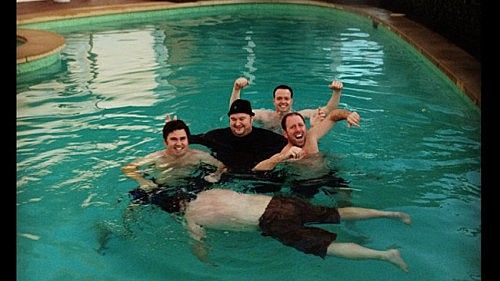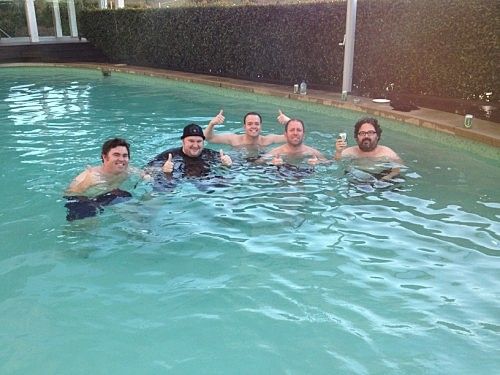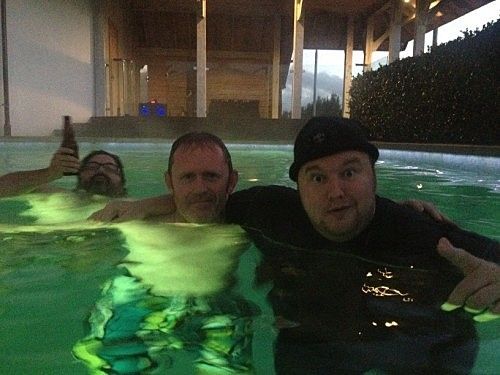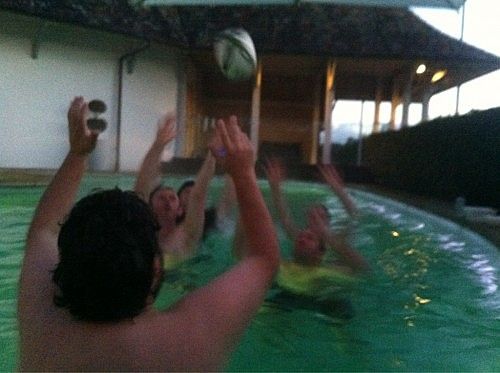My Swim With Kim
As Kim Dotcom's court case drags on, so too does our love affair with the enigmatic German conspirator. This week, José Barbosa - one of the men recently invited to Dotcom's house for a Sunday afternoon swim - recounts his time floating face-down at the mansion.
As Kim Dotcom's court case drags on, so too does our love affair with the enigmatic German conspirator. This week, José Barbosa - one of the men recently invited to Dotcom's house for a Sunday afternoon swim - recounts his time floating face-down at the mansion.
“Look, you need to have some fucking balls.”
There may have been spittle landing on my chin as these words escaped my mouth. I may have immediately followed through with a barely-stifled beer burp, the kind that filled my nose with the smell of hops and armpits. I may have farted ever so softly, punctuating “balls” with a puff of camembert-laced bum gust. But what cannot be disputed is that the very large German man seated next to me on the opulent sofa looked irritated. Ben leaned into view from behind our teutonic host with a look on his face you could only translate to “What the fuck, bro?”
I had just told Kim Dotcom his music video was shithouse.
Only four hours earlier I had been in a salt water pool (38 degrees celsius) cracking wise with some affable European millionaires and making a knob out of myself on Twitter. This is what happened. *
On the afternoon of the twenty-fourth of June I was at the computer doing some work when indicted internet entrepreneur, former hacker and hot tub enthusiast Kim Dotcom tweeted the following:
You can think what you like about Dotcom, but in his artisanal construction of novelty photos one finds a creative mind forever searching for scenarios that best prove how empty life was before shotguns and bubble bath.
Ben Gracewood, the man infamous for ditching a recurring high-profile guest spot on breakfast television because the host was a bit of a dick, responded: “Do you guys just drive around in modified electric vehicles and pose for photos? I could live like that.” Kim’s reply “Come over!” was to have profound consequences for my goal of getting some work done that afternoon.
As we traveled north to Coatesville in Ben’s cosy Subaru, we couldn't help but giggle at the thought of the forthcoming escapades. Would Kim and the boys whip out crossbows and hunt us for sport a lá 1994 Ice T vehicle Surviving The Game? What a hoot that would be, we laughed. Suddenly Ben turned serious. “Oh my God,” he said, “what if they pull out a whole bunch of cocaine and some prostitutes turn up?” This seemed a more likely scenario and one we hadn’t considered. "That would be awkward," I agreed, particularly as cocaine usually doesn’t come in bunches. We concluded that if indeed the white lady was present in both human and alkaloid form we’d leave inconspicuously, possibly through a bathroom window.
At the gatehouse a slightly nervous young guy (cocaine shakes?!) dressed in black took our details and, after talking to someone on a phone, opened the solid-looking doors into Germanic Park. Ben piloted the Subaru up the winding driveway to the mansion and, as a guard directed him into a parking space in front of a huge garage, two life-sized giraffe statues appeared on the hill: “Welcome to the House Overpriced Christmas Hampers Built,” they seemed to say.
We were ushered through the house to the pool where we finally met our hosts, Kim Dotcom, Finn Balato, Mathias Ortmann and Bram van der Kolk. Rather than rehash every detail of the evening, the ever-vigilant Toby Manhire over at the Listener has pulled together all our #swimatkims tweets in one easy-to-read post. It is, as it was meant to be, a pretty good indication of what happened, although I must point out that due to water refraction my moobs appear twice as pillowy as they are in the flesh.
As the afternoon slowly turned into the evening, #swimatkims started to trend on Twitter; a fact our hosts found to be quite amusing. They talked briefly about the notorious raid on the mansion; Finn Batato described having a gun pointed at him. They all argued they’d done nothing wrong. Kim repeated what he’d told Campbell Live in March (‘Giant exchange system in the sky!”), that American law, specifically the Digital Millenium Copyright Act (DMCA), protected Megaupload from third party breaches of copyright.
At that point, their lawyers were arguing in the High Court that the search warrant was illegal because it was overly broad. Four days after the pool party Justice Helen Winkelmann ruled in their favour. The search warrant was invalid, she said, and it was illegal for the FBI to take copies of Dotcom’s hard drives back with them to the United States. Even before the Winkelmann ruling, serious questions were being asked about due process, and these were outlined earlier this year in a clear-headed double banger by Matt Harnett. Suffice it to say that if the Police plowing over the law to satisfy the needs of a foreign power doesn’t concern you, congratulations! Your signed DVD copy of Golden (Season One) is in the mail. Predictably, the Crown is appealing Winkelmann's decision.
Presuming Kim and his team ever get extradited to the States (it’s argued by some that the Police bungling has seriously threatened this), his defence will be arguing that Megaupload fits the 'safe harbour' provisions of the DMCA. If web companies quickly take down material that infringes copyright when alerted by the respective copyright holders, they can’t be liable for what third parties are using their services for. People most often use YouTube as an example: can Google really be held accountable for people sticking their Murder She Wrote tributes on YouTube? This is what Google argued in 2007 when Viacom filed a lawsuit seeking over one billion dollars in compensation for copyright infringement. A summary judgement made in 2010 was in Google’s favour and that’s undoubtedly what Team Dotcom’s lawyer Ira Rothken will be referring to if they end up in court (a Supreme Court decision in 1984 that led to the DMCA, also name checked by Rothken as "the Sony doctrine", found that Sony wasn't liable for customers of its Betamax videotape recorders taping TV or copying other tapes).
While that might seem open and shut for Dotcom's defence, it’s worth considering that copyright law in the 21st century is a bit like firewalking with stilts made of kerosene-soaked balsa. Earlier this year a Court of Appeal threw out the earlier YouTube judgement; the case will now go to trial. The Court did, however, uphold a judgement that just having “general knowledge” of users infringing copyright wasn’t enough to hold YouTube liable.
It seems unlikely that, like YouTube, Kim Dotcom and employees of Megaupload didn’t know the extent to which the site was used for illegal carry-on. However, that may end up being irrelevant. The US Justice Department is arguing that the indicted actually conspired to facilitate copyright infringement by deleting content that wasn’t regularly downloaded and by offering financial incentives to users who uploaded popular content. This and variations on this are standard practice for cyberlocker sites like Megaupload. It’s alleged the accused were not the removed and distant service providers dutifully removing content when asked. They were right in there, hands-on, driving traffic to Megaupload by encouraging illegal sharing.
I was starting to appreciate the surreal nature of my situation. Here I was with a group of people who’d found themselves at the center of a legal, technological and cultural argument that would most likely change our definition of property and public culture. And we were drinking beer (apart from Kim: he doesn’t drink) and tweeting pictures of us eating cupcakes in a pool. These were the same pictures The New Zealand Herald would plaster over the cover and page two the next day, along with a story about a Reader’s Digest survey claiming Richie McCaw as the most trustworthy person in New Zealand. Also covered in the same issue was that week’s pending vote in Parliament on the partial state asset sale legislation: it made page four.
Kim was friendly, everything you’d expect of a fun loving German playboy. “Before you leave,” he grinned, “you must see my new video.” I didn't see any problem with that.
He enthusiastically described his new venture Megabox, a site which would, as he described in a guest post for Torrentfreak, “allow artists to sell their creations direct to consumers," allowing them to keep 90% of their earnings. Central to this was Megakey, a program users would download to their computers. Megakey, he told us, substitutes advertising on third party websites with its own. The revenue collected would go to pay artists who had their music on Megabox for free. Depending on your view it either sounds like a new model for an old system that was failing rather spectacularly, or a cumulative gangland style-execution of traditional media.
I suggested that people would accuse him of stealing their business. At that point the cherubic face of our host dropped. He grumbled something about people being able to opt out and then floated to the other side of the pool. A few minutes later he was back, conceding that I had simply told him what I thought the main criticism would be. “And I knew that anyway,” he sniffed, staring into the distance like a man harassed by the snapping maw of smaller minds burdened by trifling matters such as intellectual property and creative sovereignty.
They had nice things to say about Media7, the former TVNZ7 show I worked on. Kim said the show had the most balanced analysis in the aftermath of their arrest. Presumably unaware of any irony, he lamented the state of journalism and the way their case had been covered. Much later, in front of the raging loggia of the pool house, I asked Bram if he agreed that the creation of the internet and the web led to the audience migrating away from traditional media and if this, in turn, had decimated advertising revenue. “Of course you guys aren’t to blame,” I said, “but you’re part of that world. What if the old system was actually the best business model for creating the largest amount of quality journalism?”
Bram looked at me for a moment. "Some things always lose out when better things come along," he said.
I think at this point it’s fair to say that I’d been enjoying myself. Kim and his wife Mona were excellent hosts, everyone seemed genuinely warm and I was on fire. Sample exchange:
Bram: “Hey, you look like someone famous. You look like–”
Me: “Brad Pitt!”
Everyone: Laughter
Boy, I was slaying.
I was also quite pissed. I’d cracked through the beer Ben and I had brought along and Vaughn Davis’ booze as well. By the time Kim suggested Ben and I have a look at his new video I’d been weighing up the chances of finding a long forgotten wing of the mansion and curling up for forty winks in a discarded Chrisco hamper display.
We followed Kim past the kitchen with the huge fish tank filled with nearly sixty tropical fish, then through room after room until we found ourselves sitting in front of a flat screen television so big it could’ve doubled as a shelterbelt. Kim pressed play and we watched the video for Hey Mr President, an anthem for internet freedom disguised as mid-nineties chart bait or Aqua-lite. Sample lyric: “We must expose/the people who chose/to turn innovation into crime.” The video features a confusing reference to Martin Luther King and people protesting in the street dressed in the famous Guy Fawkes masks from V For Vendetta and now appropriated by the Scientology griefers, Anonymous. But no images of Barack Obama, which struck me as a little odd.
“Well,” said Kim “I think people will know who we’re talking about.”
Which, of course, is a reasonable thing to say, but right then and there I wasn’t really doing reasonable. “If you say Mr President, show the President!”
Kim turned to the table behind us where the other three accused, wives and partners had silently assembled. “What do you think?” he asked.
The sentiment from the room was clear. They were against rocking the boat with Obama too much. And, more importantly, against disagreeing with Kim.
It was then that I questioned the composition of Dotcom’s genitalia. The room filled with the sound of blood vessels popping as everyone held their breath. Then I really got going: I think you should go and interview Alan Moore, because, y’know, it makes it legitimate I mean I think it’s perfectly fine and all but oh what we’re going oh OK NICE MEETING YOU
We rounded up our togs and bits and pieces and walked back out the main door, past the dinner table. Kim was sitting at it looking like someone had just told him he had no balls. THANKS FOR THE SWIM BYE!
Back in the Subaru, Ben swore he was leaving anyway. It’s all good. Funny, even. But no, we can’t stop at Burger King. Bastard.
I stumbled through my front door and down to the bedroom where my partner was reading in bed. Did I have a good time, she asked? YEP GREAT I HAD A SWIM. That’s nice, she said, come to bed – knowing full well I’d be asleep as soon as my head touched the pillow, restoring the quiet.
In no state to bother with official sleeping attire, I dropped my trousers. But something was not quite right. My girlfriend peered over her book. “What’s wrong?”
I lifted my t-shirt up and looked down. Where there should have been cotton boxers, there was only pool-wrinkled flesh constricting in the chill of the uninsulated room. I had left my undies at Kim Dotcom’s. *
Tune in here for Part II, where José and Matt discuss Kim's case, its implications for intellectual property law and Dotcom's celebrity.






